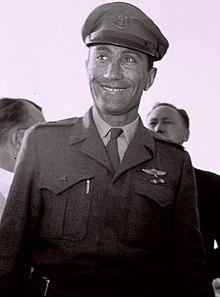Meir Amit
Meir Amit ( Hebrew מאיר עמית; * March 17, 1921 as Meir Slutzki in Tiberias , then Palestine ; † July 17, 2009 in Tel Aviv-Jaffa , Israel ) was an Israeli general ( Aluf ) and from 1963 to 1968 director of the Israeli secret service Mossad .
Life
Amit entered the Hagana as early as 1936 . He finished his school education by attending a grammar school in Tel Aviv . In 1941 Amit married Yona Kelman, with whom he had three daughters. From 1939 to 1952 he was a member of the Kibbutz Alonim.
His military career included several officer and commanding posts from 1940 to the beginning of the 1950s. In 1948 he took part in the Israeli War of Independence . In 1950 he was given command of the Golani Brigade . He studied at the Columbia Business School in New York City business . After his return from the United States in 1954, he became head of the Aman Military Reconnaissance Service . He held this post again and again until 1963, although in the meantime he switched several times to high commanding posts in the field army. 1955–1956 Amit had command of the southern command and 1958–1962 of the northern command .
In 1963, Meir Amit succeeded Isser Harel at the head of the Mossad. The new Mossad boss attached particular importance to the development of a comprehensive network of agents and informants in the Arab world and to close ties to the American CIA . At first there was considerable resistance from the ranks of the service to the new boss. Amit had previously criticized Harel's administration. He was held responsible for the fall of his predecessor by numerous Mossad employees and was not accepted. However, he rejects the accusation.
After Amit prevailed, however, the Mossad achieved several successful operations, including the deployment of top spy Eli Cohen in Syria and the theft of a MiG-21 from the Iraqi Air Force in 1966, which was flown to Israel by a deserting pilot. The reconnaissance operations carried out under Meir Amit made a significant contribution to Israel's success in the 1967 Six Day War . The hijacking of patrol boats, which were built in France for Israel but were not delivered, goes back to Amits' orders, but was not carried out until 1969. In 1968 Zvi Zamir succeeded him as Mossad boss.
Even after his resignation as director of the Mossad, Meir Amit acted as security and intelligence advisor to the Israeli government. From 1968 to 1977 he headed “Koor”, an armaments company affiliated with the Histadrut . Meir Amit was one of the founders of the Tnu'a Demokratit LeSchinui party in 1976 , which was reorganized as Schinui in 1978 . From 1977 to September 15, 1978 he was a member of the Menachem Begin government as Minister of Transport and Communications. During this time he was a member of the 9th Knesset and, in this capacity, a member of the Foreign and Defense Committee. In 1980 he joined the Labor Party .
literature
- Meir Amit: A Life in Israel's Intelligence Service: An Autobiography ( English ). Vallentine Mitchell Publishers, 2009, ISBN 978-0-85303-648-7 .
Web links
- Meir Amit. In: Knesset Members. Knesset , accessed March 26, 2014 .
- Meir Amit in the Wall Street Journal
Individual evidence
- ^ Obituary in the Daily Telegraph , accessed August 16, 2012.
- ↑ Daniel Gerlach: "If you don't hear anything, I'm fine". In: zenith. Candid Foundation gGmbH, July 16, 2018, accessed on August 3, 2018 .
- ^ Yossi Melman: Ex-Mossad chief Meir Amit dies at 88 (English) , Haaretz . July 17, 2009. Archived from the original on July 19, 2009 Info: The archive link was automatically inserted and not yet checked. Please check the original and archive link according to the instructions and then remove this notice. . Retrieved July 18, 2009.
- ↑ Meir Amit. Retrieved May 15, 2015 .
| predecessor | Office | successor |
|---|---|---|
| Isser Harel |
Director of the Mossad 1963–1968 |
Tzwi Zamir |
| personal data | |
|---|---|
| SURNAME | Amit, Meir |
| ALTERNATIVE NAMES | Slutzki, Meir (maiden name) |
| BRIEF DESCRIPTION | Israeli general, director of the Israeli secret service Mossad (1963–1968) |
| DATE OF BIRTH | March 17, 1921 |
| PLACE OF BIRTH | Tiberias , Palestine |
| DATE OF DEATH | July 17, 2009 |
| Place of death | Tel Aviv-Jaffa , Israel |
